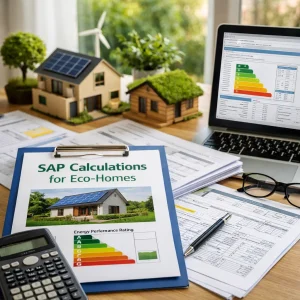A government-commissioned review of the UK’s aims to fully decarbonise the economy by 2050 has called for a ban on sales of all natural gas boilers within the next ten years.
The recommendation has been made as part of a significant ‘net zero’ review that was undertaken last year. It aims to ensure a more rapid and effective strategy to move away from relying on fossil fuels for domestic heat in favour of heat pumps.
Plans to introduce a ban on the sale and installation of existing boilers on the market by 2033 are proposed to the government as part of a ten-year plan to ensure widespread adoption of heat pumps.
The 2021 Heat and Building Strategy had committed to phasing out the use of systems such as natural gas and heating oil boilers that can only operate using fossil fuels by 2035. The strategy ruled out implementing a ban and focused on incentivising the installation of low carbon heating alternatives instead.
Some organisations working across building engineering and construction have continued to calo for a direct ban on existing boilers on the market to provide more investment certainty to the HVAC industry.
The ‘Mission Zero’ review of net zero policy, which was overseen by Conservative MP Chris Skidmore, has set out 129 recommendations for the government to implement. These recommendations focus on the role businesses and authorities can play to help drive the net zero transformation of both power and buildings, while also ensuring more energy efficient homes.
In terms of the recommendations directly linked to creating homes that are cheaper and more sustainable to heat, the review called for the government to ensure legislation is in place to ensure the Future Homes Standard is launched as intended by 2025. The implementation of this standard would ensure that no new build homes are built with a natural gas boiler or system exclusively designed for using fossil fuels by 2025. It would also require all homes to be sold by 2033 to at least meet the EPC band C rating.

Efficiency measures
Another proposal from the review would be to reform the existing EPC ratings to create a new Net Zero Performance Certificate (NZPC) that would provide a clearer view of the efficiency performance of a property.
The review stated that this recommendation would be important to assist and inform homeowners about the best way to retrofit existing properties to improve energy efficiency.
It said: “Currently, the EPC measure does not work for net zero. The EPC rating of a property can sometimes show a worse score after installing a heat pump because of the inclusion of the cost of heating in the score, and this assessment being based on outdated assumptions.”
“EPC ratings can overestimate the cost of running a home with a heat pump due to outdated measures of heat pump efficiency and the history of gas prices being artificially lowered in comparison to electricity prices (because the gas bills would bear fewer policy costs).”
Energy generation
The holistic focus of the review also calls for the introduction of a “cross-sectoral infrastructure strategy” that will focus on building and adapting energy supplies and systems to look at improving the low carbon production of electricity, hydrogen and other liquid and gaseous fuels.
Some of these approaches will be vital for meeting the energy and heating needs of heavy industry, according to the review. The review itself makes no mention of hydrogen boiler systems that are currently being developed by a range of manufacturers to help the government make a decision by 2026 on whether the gas should be considered as part of national heat decarbonisations plans in homes.
However, it did call on the government to continue to work towards ensuring hydrogen heating community trials go ahead as scheduled to inform studies about the case for using the gas in homes.
The review added: “Additionally, by the end of 2023, government should update its analysis of the whole system costs of the mass roll out of hydrogen for heating, in order to ensure that the case for economic optimality and feasibility still holds.”
Among other areas considered in the review is the importance to ensure there is sufficient capacity of cheaper, low carbon sources of energy such as electricity. Both regulator Ofgem and the government are urged to ensure plans are in place for the longer-term secure investment in the electricity grid. A number of responses from industry and other organisations to the review warned that the planned roll out of heat pumps and electric vehicles risks being undermined without investment in grid infrastructure.

Electricity levies
There was further pressure in the review for the government to honour its previous commitments to review existing levies on electricity. It concluded these levies continued to adversely incentivise the use of gas as a source of heat and energy over switching to electricity.
The document stated: “The past approach of levying policy costs and taxes onto electricity bills keeps the price of electricity artificially high and can stifle the signal for the use of low-carbon technologies, from electrifying industrial fuel use to vehicles and heat pumps.”
“Analysis conducted for the review shows that keeping the relative price of electricity versus gas consistently competitive on a long-term basis will be the single biggest determinant of ensuring that the transition brings a significant amount of savings to the average household.”
Skills Challenge
Skill shortages were highlighted in the review was being a significant challenge for decarbonisation in almost all sectors studied. Respondents to the review working in the construction and building engineering sectors warned that the need to rethink skills training to address demand for lower carbon technologies would exacerbate ongoing concerns about the failure to effectively recruit and train up individuals to replace an ageing workforce.
Multinational home improvement retailer Kingfisher was cited as warning about a lack of confidence in parts of the industry that sufficient skills existed to retrofit buildings at scale.
Kingfisher stated in written evidence provided to the review: “Some crucial areas show concerning existing skills gaps, including tradespeople, where depending on the sector, we have seen a five to 30 per cent decline over the past three years, undermining the UK’s ability to undertake retrofitting and install heat pumps, and construction.”



